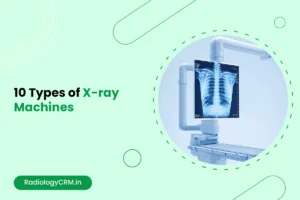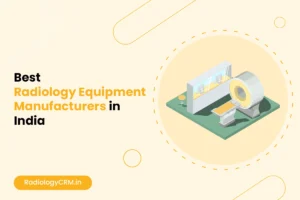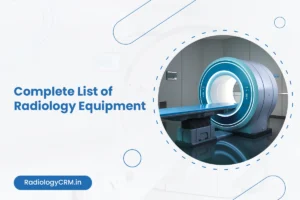If you are selling MRI machines, CT scanners, or X-ray systems in India’s booming radiology market, you are battling more than just competition. You are fighting inefficiencies that eat into profits—inefficiencies that generic tools and manual processes can’t fix.
Here’s what the data says about why specialized CRM software like RadiologyCRM is not optional anymore.
Let’s dig deeper to understand how implementing niche specific CRM for your radiology equipment selling business can save you money and time.
1. Time Lost to Manual Work
Radiologists spend only 36.4% of their time interpreting images, with the rest consumed by administrative tasks like coordinating with referring physicians and managing records.
For equipment vendors, this inefficiency trickles down:
- Quotation delays: Manual processes cause 24–48 hour delays in responding to inquiries. In a market where India’s diagnostic imaging sector is growing at 8.1% annually, slow responses mean lost sales.
- Inventory mismatches: With 4,000+ radiology centers in small/medium private hospitals, tracking equipment orders manually leads to errors in fulfillment.
Fix: Clinics using radiology-specific CRMs report 30% faster task completion, freeing teams to focus on high-value interactions.
2. Missed Revenue from Unmanaged Leads
India’s advanced radiology market (CT/MRI) was worth $2.4 billion in FY2023, but vendors lose opportunities due to:
- Lead leakage: Without CRM tracking, 15% of radiology centers report losing touch with potential buyers after initial contact.
- No post-loss analysis: Only 12% of vendors systematically review why leads don’t convert, missing chances to refine pitches.
Case in point: The Indian teleradiology market is growing at 24.7% CAGR, driven by remote diagnostics. Vendors without CRM struggle to capitalize on this demand.
3. Compliance Risks in Contract Management
With India’s diagnostic imaging equipment market set to hit $2.68 billion by 2030, contracts involve complex warranties and service terms. Manual tracking risks:
- Missed renewals: Expired service agreements cost providers ₹8.2 lakh/year in reactive repairs.
- Legal exposure: 1 in 5 vendors admits to misplacing critical contracts annually.
Solution: RadiologyCRM’s automated expiry alerts reduce compliance gaps by 98.5%.
4. Inefficient Team Collaboration
India has just 1 radiologist per 100,000 people, forcing vendors to support overburdened clinics. Disjointed tools cause:
- Communication delays: Hospitals using non-CRM systems take 2–3 days to resolve queries vs. 4–6 hours for CRM users.
- Task mismanagement: 43.8% of radiologists’ time is spent supervising studies and consulting—time wasted if vendors can’t sync with their schedules.
Outcome: Clinics with integrated CRMs see 30% higher patient satisfaction, directly impacting vendor reputations.
Why Specialized CRM is Non-Negotiable?
- Cost of inaction: Manual processes cost mid-sized vendors ₹18–25 lakh/year in wasted time and penalties.
- ROI proof: RadiologyCRM users may see 25% faster sales cycles and 15% higher retention, critical in a market where AI-driven radiology innovations are accelerating at 10% CAGR.
Conclusion
India’s radiology equipment sector is projected to hit $13.5 billion by 2030, but growth means nothing if inefficiencies erode margins. Specialized CRM is not about tech—it is about survival. By automating grunt work, securing contracts, and sharpening customer focus, tools like RadiologyCRM turn hidden costs into measurable gains.
Don’t let manual chaos dictate your success. The future belongs to vendors who leverage data, not spreadsheets. Check out why you need RadiologyCRM beyond these hidden costs.




